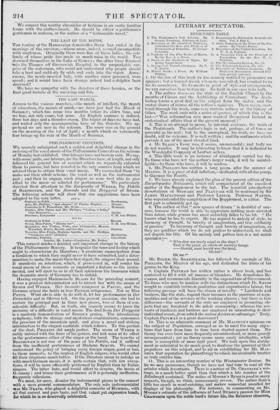PHILHARMONIC CONCERTS.
WE scarcely anticipated such a sudden and delightful change in the ordering of the vocal music of the Philharmonic Concerts as the scheme of Monday last exhibited. Our labours have not been in vain. We say, with some pride, our labours, for the Directors have, at length, not only followed the general line of conduct which we repeatedly exhorted them to pursue, hut have resorted to the very sources from which we advised them to obtain their vocal music. We counselled them "to make out their whole scheme, the vocal as well as the instrumental part ; and then to engage such singers as were best able to give effect to the music so selected for performance." We particularly directed their attention to the Euryanthe of WEBER, the Fidelio of BEETHovErq, and the Jessonda and the Berggeist of SPOHR. The following scheme will show that our suggestions have been adopted to the very letter. ACT 1.
Sinfonia in B flat ....... .. Beethoven.
Aria, Mr. Phillips," Qui sdegno" (IL Flauto Magico) .... Mozart.
Concerto In E, Pianoforte, Mr. Neate . . Hummel. Duetto, Miss Paton and Mr. Phillips, "Calm., o bella,"
(Der Berggeist) . ..... Spohr. Overture, Euryanthe ............ ..... . .... C. M. von Weber.
ACT If.
Sinfonia in E Hat Mozart.
Scena, Miss Paton, " Misera me".. ....... M C. M. von Weber.
Quartetto, two Violins, Viola, and Violoncello, Messrs Weischel, Watts, Moralt, and LindleyOnslow. Terzetto, Miss Paton, Madame Spechi, and Mr. Phillips,
" Coraggio, orsb" (Fidelio) Beethoven.
Overture, Fanisk a. Cherubini. Leader, Mr. Loder—Couductor, Mr. Potter.
This concert marks a decided and important change in the history
of the Philharmonic Society. It bespeaks the tone and feeling which ou,ott to characterize its Directors ; it proclaims emancipation from a thraldom to which they ought never to have submitted, and a deter- mination to make the music their first object, the singers their second. It manifests an intention, which, if persevered in, will render the vocal music of these concerts as important a feature as the instru- mental, and will open to us in all their splendour the treasures which the dramatic music Of Germany has to unfold.
Having engaged Mademoiselle BLASIS for the preceding concert, it was a prudent determination not to intrust her with the music of SPorra and WEBER. Her favomite composer is PACINI, and the German school she holds in true Parisian abhorrence. Not so Miss PATON. What she is able to do with it, let her performance in Der l'reischiitz and in Oberon tell. On the present occasion;' she had to sustain the principal part in three new pieces, two of them of con- siderable -difficulty. But, in truth, she scarcely seems to know the meaning, of a difficulty in vocal music. The duet from Der igerggeist is a masterly demonstration of SPOHR'S genius. The introductory syMphony, with its strange and mysterious combinations, announces the presence of the mountain spirit, and gives a novel and striking. introduction to the elegant cantabile which follows. To this portion of the duet, PHILLIPS did ample justice. The scena of WEBER is richly imbued with the force of his genius, and lost none of its effect in the performance either of the singer or the band. The terzetto of BEETHOVEN is not one of the gems of his Pidelio, and it suffered from the inefficient performance of Madame SPECHI. We cannot understand the policy of bringing every foreign singer, good or bad, to these concerts, to the neglect of English singers, who would often fill their situations much better. If the Directors mean to indulge us with muchGerman music, it is quite certain that, with few excep- tions, it will be more efficiently performed by English than by Italian singers. The latter hate, and would affect to despise, the music of Germany; and hence their performance of it is generally ineffective,
frequently ridiculous. We must, for once, dismiss the instrumental pieces in the concert
with a mere general commendation. The only solo instrumentalist was Mr.Nakda, who played a delightful concerto of HUMMEL, with all that correct and pure taste, and that volant yet expressive touch, tQ1 which he is so deservedly celebrate&


































 Previous page
Previous page